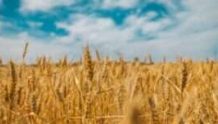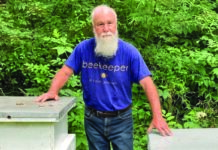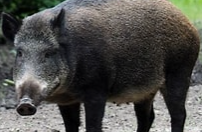From the Office of Public Affairs | http://www.news.ku.edu
Headlines
Discovery of ancient plant fossils in Washington points to paleobotanic mystery
LAWRENCE — A new description of two well-preserved ancient fossil plant specimens in Washington state co-written by University of Kansas researchers is prompting paleobotanists to rethink how plants might have been dispersed during the Late Cretaceous, between 66 and 100 million years ago. Research published in New Phytologist details two fossil winged fruits from the genus Ceratopetalum — previously believed to be limited in range to the Southern Hemisphere during the Cretaceous. Yet these new fossils were found on Sucia Island in Washington state. The surprising discovery is causing paleobotanists to reconsider how extended their range may have truly been and how it may have occurred.
KU Debate qualifies for National Debate Tournament for 55th consecutive season
LAWRENCE — The University of Kansas Debate team of juniors Mickey McMahon, of Leawood, and Michael Scott, of Glenview, Illinois, were selected as automatic qualifiers for the National Debate Tournament. The top 16 teams in the country based on season-long performance are selected by the NDT National Committee to receive automatic qualification to the national tournament. This is the 55th consecutive year that KU Debate has qualified for the National Debate Tournament.
Black History Month Keynote: Eddie Glaude Jr. to speak on the ethics of anti-racism
LAWRENCE — The Office of Diversity, Equity, Inclusion & Belonging will welcome an author and distinguished professor from Princeton University for a Black History Month event at the University of Kansas. Eddie Glaude Jr. will present “The Ethics of Anti-Racism” at 4:30 p.m. Feb. 25 in the Kansas Union Ballroom. The event will also be livestreamed.
Full stories below.
————————————————————————
Contact: Brendan Lynch, KU News Service, 785-864-8855, [email protected], @BrendanMLynch
Discovery of ancient plant fossils in Washington points to paleobotanic mystery
LAWRENCE — A new description of two well-preserved ancient fossil plant specimens in Washington state is prompting paleobotanists to rethink how plants might have been dispersed during the Late Cretaceous, between 66 and 100 million years ago.
Research published in New Phytologist details two fossil winged fruits from the genus Ceratopetalum — previously believed to be limited in range to the Southern Hemisphere during the Cretaceous. Yet these new fossils were found on Sucia Island in Washington state. The surprising discovery is causing paleobotanists to reconsider how extended their range may have truly been and how it may have occurred.
“In this paper, we were looking at two fossil fruits we had assigned to the genus Ceratopetalum, which is in the flowering-plant family Cunoniaceae,” said lead author Keana Tang, doctoral student in ecology & evolutionary biology at the University of Kansas and the KU Biodiversity Institute and Natural History Museum. “Both the family Cunoniaceae and the genus Ceratopetalum still have living members today. What’s interesting is the genus Ceratopetalum is now only found in Australia. Well, the entire family is restricted to the Southern Hemisphere — so it’s weird to find this fossil all the way up here in the Northern Hemisphere. We thought, ‘Whoa, how did this get here?’”
Tang and her collaborators dubbed the new fossil species Ceratopetalum suciensis after the island in Washington where they were discovered.
Today, modern versions of the genus Ceratopetalum prevail in the wet tropical rainforests of Australia, where they play a vital role to ecosystems.
“You’ll find forests that are just dominated by these species,” Tang said.
But she said the findings are made more significant because Ceratopetalum and the larger family Cunoniaceae are part of “Paleo-Antarctic Rainforest Lineages,” or PARLs — plants thought to have originated in the ancient Gondwanan landmass before spreading northward. So, a better understanding of how Ceratopetalum extended its range could better inform scientists how a key larger group of plants widened its range through geologic time.
“They have a joint history where they were likely around Antarctica and spread northward as time progressed and tectonic plates changed, causing the climate to change. As Antarctica is getting colder, these plants are moving up to South America, South Africa and Australia,” Tang said. “It’s interesting because the Paleo-Antarctic Rainforest Lineages are all expected to have a southern origin. Now that we have this record of a fruit in the Northern Hemisphere, it’s bringing up new questions. Was the family Cunoniaceae actually cosmopolitan — were they found everywhere? Or was this just kind of a lucky chance, where it somehow transported northwards through an exchange from the Antarctic to South America to North America?”
According to Tang’s KU adviser and co-author, Brian Atkinson, assistant professor of ecology & evolutionary biology and curator with the Biodiversity Institute’s Division of Paleobotany, the findings highlight new possibilities for a biotic exchange between North America and South America-Antarctica that may have occurred during the Late Cretaceous.
“In some ways this is like finding a penguin in North America,” he said.
The Ceratopetalum suciensis fossils were collected on Sucia Island by fossil hunters David Starr and Jim Goedert, then Micro-CT-scanned at the University of Michigan by co-author Selena Smith. Then, to classify them with the utmost accuracy, Tang analyzed them layer by layer using a painstaking process called the cellulose acetate peeling technique.
“I started peeling the rock,” she said. “Essentially what’s happening is you take the rock face and there’s a series of steps where you polish the face of the fossil and dip it into 5% hydrochloric acid for a couple of seconds. It’s very safe — you can even dip your hands in the acid, and you will still have your fingertips. So, you dip it into the acid for a few seconds, and then you rinse the rock off with water. Then you rinse it with acetone, and you get this plastic sheet. That’s the cellulose acetate sheet. Next, you spray the fossil face with the acetone again and then lay the sheet down — and that entire process gives you a very, very thin section of the rock, a few micrometers. But it’s nice because you can go through the entire fossil and pick up different structures hiding in the rock matrix you might miss in a Micro-CT scan.”
Through these processes, Tang was able to place the fossils in the genus Ceratopetalum and raise new questions about how plants spread millions of years ago. Additionally, the research suggests the Pacific Northwest, where Ceratopetalum suciensis was discovered, is a promising region for further work by paleobotanists.
“There’s just so much to look into, especially in the Western coast of North America,” Tang said. “I understand there’s just not a lot of people there doing that kind of work. It’s relatively understudied. I think a lot of the paleobotanic world has been situated along the East Coast or the Western interior.”
The paper in New Phytologist represents Tang’s first authorship on a study in a peer-reviewed journal and her first time as a lead author. She grew up in the suburbs north of Los Angeles and came to KU after meeting Atkinson and learning about his work when she was an intern at the Natural History Museum of Los Angeles.
Once Tang earns her doctorate, her ambition is to continue making discoveries as a researcher.
“I would ideally like to work in a museum setting,” she said.
-30-
————————————————————————
The official university Twitter account has changed to @UnivOfKansas.
Refollow @KUNews for KU News Service stories, discoveries and experts.
Tweets by KUnews
————————————————————————
Contact: Scott Harris, KU Debate, 785-864-9878, [email protected], @KansasDebate
KU Debate qualifies for National Debate Tournament for 55th consecutive season
LAWRENCE — The University of Kansas Debate team of juniors Mickey McMahon, of Leawood, and Michael Scott, of Glenview, Illinois, were selected as automatic qualifiers for the National Debate Tournament. The top 16 teams in the country based on season-long performance are selected by the NDT National Committee to receive automatic qualification to the national tournament. This is the 55th consecutive year that KU Debate has qualified for the National Debate Tournament.
In 1973, the National Debate Tournament began recognizing the top 16 teams in the country as automatic first-round at-large qualifiers for the tournament. McMahon and Scott are the 42nd KU duo to receive a first-round automatic qualification to the national tournament. They ended the regular season ranked eighth in the country in the College Policy Debate Ratings. This is the third time that McMahon and Scott have qualified to compete at the National Debate Tournament.
Joining KU as automatic qualifiers for the National Debate Tournament are teams from Dartmouth College, Emory University, George Mason University, Harvard University, Liberty University, Northwestern University, the University of California-Berkeley, the University of Kentucky, the University of Michigan, the University of Southern California, the University of Texas and Wake Forest University.
KU will seek to qualify additional teams for the NDT through regional qualifying tournaments and a second-round at-large process that fill out the rest of the 78-team field. The national tournament will be held at James Madison University from March 31 to April 4. KU has reached the Final Four at the NDT in five of the last six seasons including last year and last won the national championship in 2018.
-30-
————————————————————————
Subscribe to KU Today, the campus newsletter,
for additional news about the University of Kansas.
http://www.news.ku.edu
————————————————————————
Contact: Mytrice Allen, Office of Diversity, Equity, Inclusion & Belonging, 785-864-0512, [email protected], @KU_diversity
Black History Month Keynote: Eddie Glaude Jr. to speak on the ethics of anti-racism
LAWRENCE — The Office of Diversity, Equity, Inclusion, and Belonging will welcome an author and distinguished professor from Princeton University for a Black History Month event at the University of Kansas.
Eddie Glaude Jr., a noted scholar and political analyst, will present “The Ethics of Anti-Racism” at 4:30 p.m. Feb. 25 in the Kansas Union Ballroom. The event will also be livestreamed.
Glaude’s work examines the complex dynamics of the American experience. His writings, including “Democracy in Black: How Race Still Enslaves the American Soul,” “In a Shade of Blue: Pragmatism and the Politics of Black America,” and his most recent, the New York Times bestseller “Begin Again: James Baldwin’s America and Its Urgent Lessons for our Own,” take a comprehensive look at Black communities, the difficulties of race in the United States and the challenges Americans face as a democracy.
Glaude challenges his audiences to engage in a continuous critique of racism’s forms and urges them to think more carefully and analytically about racial issues. His approach necessitates a moral and ethical reckoning, in contrast to a “quick fix” of simply crossing action items off a list. During his talk, Glaude will guide the audience through the deconstruction of whiteness and the way in which it determines the distribution of advantages and disadvantages in society.
“Dr. Glaude is a prolific scholar and public intellectual whose insights are reshaping how we talk about race, racism and systemic inequity in the United States. Dr. Glaude’s frank analysis offers prescriptive solutions that force us to reconcile just how much more work needs to be done to facilitate sustainable change in academia that addresses racial injustice in material ways,” said Nicole Hodges Persley, interim vice provost for diversity, equity, inclusion & belonging.
More information is available on the Office of Diversity, Equity, Inclusion & Belonging’s website. Anyone in need of accommodations to attend this event should reach out to Mytrice Allen, events and engagement coordinator, at [email protected].
-30-
————————————————————————
KU News Service
1450 Jayhawk Blvd.
Lawrence KS 66045
Phone: 785-864-3256
Fax: 785-864-3339
[email protected]
http://www.news.ku.edu
Erinn Barcomb-Peterson, director of news and media relations, [email protected]
Today’s News is a free service from the Office of Public Affairs





